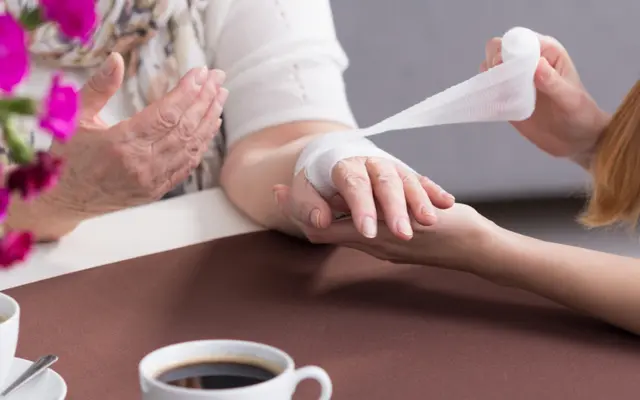
Wound care is something all people need from time to time. If you fall and scrape your knee, cut yourself while making dinner, or have a wound from surgery to tend to, it’s important to know how to clean and care for the injury to prevent infection and other serious issues.
As a caregiver, wound care is especially important. Cleaning and changing wound dressings at regular intervals can speed up your loved one’s healing process and ensure they remain healthy. Our Care Specialists often receive questions about wound care, so we’ve compiled this list of the best products to have on hand.
What types of injuries require wound care?
Before we discuss some of the best wound care products, you need to have a basic understanding of the different types of wounds.
Open wounds fall into four categories: abrasions, lacerations, punctures, and avulsions.
Abrasion: Abrasions occur when your skin rubs against a hard surface, like concrete or asphalt. These wounds rarely bleed, but they tend to get dirt and debris caught in them.
Laceration: A laceration causes a significant break in your skin. Often, these wounds occur due to contact with a sharp object, such as a knife, scissors, or hand tools.
Puncture: A puncture wound occurs when your skin is penetrated by a sharp object, like a thumbtack or a nail. Puncture wounds don’t always bleed, but depending on the length of the object that causes the wound, they may result in internal damage.
Avulsion: Avulsions are large wounds that occur due to sudden trauma, like a car accident or explosion. They bleed heavily and are potentially life-threatening.
If you care for someone who is bed-limited or in a wheelchair, you also need to be aware of pressure ulcers. These wounds tend to form on the bony areas of the body and occur due to prolonged periods of sitting or lying down.
What wound care products should caregivers have on hand?
Cleaning supplies
Whenever someone experiences a cut, a scrape, or another similar injury, it’s important to keep the wound clean. First, rinse the wound off in cool tap water. Then, carefully wipe away any dirt or debris with a clean washcloth. Next, let the tap water warm up and use a gentle, unscented soap to thoroughly cleanse the wound.
Soap and water can safely clean most lesions, including small surgical wounds, but if your senior experiences a deep cut or they develop leg ulcers or foot ulcers, it’s a good idea to also apply a disinfectant. Be careful not to go overboard. Too much antiseptic can actually harm healthy tissue.